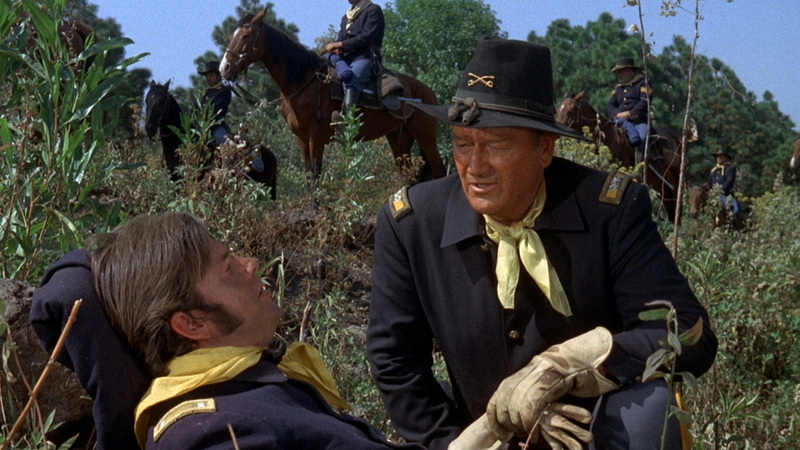
A Story Searching for Its Own Center
MOVIE REVIEW
Rio Lobo (Blu-ray)
G –
Genre: Western
Year Released: 1970
Runtime: 1h 54m
Director(s): Howard Hawks
Writer(s): Leigh Brackett, Burton Wohl
Cast: John Wayne, Jorge Rivero, Jennifer O’Neill, Jack Elam, Christopher Mitchum
Where to Watch: available now, order your copy here: www.eurekavideo.co.uk
RAVING REVIEW: There’s something fitting about a director closing out a career by returning to the genre that shaped so much of his legacy, and that’s exactly what happens with Howard Hawks’ RIO LOBO. This film emerged in an era where Westerns were undergoing rapid transformation, yet it approaches the frontier with the same hand that Hawks had relied on for decades. That tension between a filmmaker’s identity and a genre’s evolution becomes the backbone of the film’s character.
RIO LOBO opens with a meticulously paced train robbery during the Civil War, staged with clarity and a grip on tension that reminds you why Hawks’ name still carried weight. The conflict is simple yet effective, centered on a Union payroll train and a tightly formed Confederate raiding force. Through this sequence, the film immediately establishes John Wayne’s Cord McNally as a man deeply tied to honor, responsibility, and the grief of losing someone he considered a family member. It’s an early promise of emotional stakes the movie hopes to build upon.
The story shifts after the war, following McNally as he searches for the traitors who betrayed his unit and cost him his closest friend. The setup has a clean hook, but RIO LOBO isn’t interested in a straight revenge narrative. Instead, it slides into a more sprawling structure, adding new characters, political tensions, and layers of corruption surrounding a lawless Texas town. It’s a path that gives the film a wide landscape to move through, but it also creates a sense of fragmentation. Each section works on its own terms, yet the transitions between them don’t always land with the weight the film aims for.
One of the film’s strengths is the bond between McNally and the former Confederate soldiers Frenchie and Tuscarora. Their dynamic reflects the Hawks’ recurring fascination with camaraderie: people who were once adversaries gradually learning to trust one another through shared adversity. Wayne brings a grounded presence that anchors every interaction, and Jorge Rivero and Christopher Mitchum contribute enough personality to make the partnership believable even when the story grows uneven.
Where the film starts to falter is in the midsection and beyond, where the focus shifts toward Rio Lobo itself. The corruption plot, centered around landowner Ketcham and the sheriff who enforces his rule, shapes the second half, but the pacing becomes inconsistent. The core motivations remain clear, yet the narrative stretches itself too thin with detours and moments that feel more like echoes of Hawks’ earlier work than confident new storytelling. It’s here that the film’s reputation as a lesser companion to RIO BRAVO and EL DORADO becomes most apparent.
Performance-wise, there’s a sharp divide. Wayne has no trouble settling into the weathered, principled hero he played countless times. Jack Elam injects the film with much-needed unpredictability and humor, giving the later sections an energy they otherwise lack. The younger cast members, however, struggle to match that presence. Jennifer O’Neill’s performance, in particular, draws attention for how tentative it feels, as if the role needed someone more comfortable navigating Hawks’ style of dialogue and rhythm. Rivero has charisma, but occasionally gets lost in the film’s demands. It becomes one of the clearest signs that Hawks’ traditionalist approach was pressing against the changes in Hollywood performance trends around 1970.
RIO LOBO carries a sense of warmth and loyalty that keeps it from feeling hollow. Hawks always had an instinct for portraying groups under pressure—how they rely on each other, how small gestures reveal character—and that remains one of the highlights here. Scenes around campfires, quiet moments between Wayne and Rivero, and the recurring attempt to define what makes a man trustworthy give the film texture even when the plot stumbles.
The Western genre was evolving rapidly at this time, shifting toward harsher and more violent themes, moral ambiguity, and a more stylized grit. RIO LOBO doesn’t fight that shift so much as it sidesteps it. It attempts to stand firmly in older traditions, which lends it charm but also limits its depth of resonance. The shifts can feel unbalanced, and the film’s ambitions don’t always match its execution. Yet its sincerity keeps it compelling, even during its uneven stretches.
As Hawks’ final film, RIO LOBO feels like a man choosing to say goodbye in the way he wanted. It doesn’t redefine the Western, and it doesn’t need to. Instead, it offers a mix of strength, nostalgia, missteps, and heart—an imperfect but earnest farewell from a director who shaped the genre more than most.
If this had been made earlier in Hawks’ career, the shortcomings might have landed differently. But viewed today, it becomes a window into a transitional moment in cinema, where a master of the genre made one more attempt to hold onto the values that defined his storytelling. And even imperfect, that effort carries its own kind of weight.
Please visit https://linktr.ee/overlyhonestr for more reviews.
You can follow me on Letterboxd, Instagram, Twitter, and YouTube. My social media accounts can also be found on most platforms by searching for 'Overly Honest Reviews'.
I’m always happy to hear from my readers; please don't hesitate to say hello or send me any questions about movies.
[photo courtesy of EUREKA ENTERTAINMENT]
DISCLAIMER:
At Overly Honest Movie Reviews, we value honesty and transparency. Occasionally, we receive complimentary items for review, including DVDs, Blu-rays, CDs, Vinyl Records, Books, and more. We assure you that these arrangements do not influence our reviews, as we are committed to providing unbiased and sincere evaluations. We aim to help you make informed entertainment choices regardless of our relationship with distributors or producers.
Amazon Affiliate Links:
Additionally, this site contains Amazon affiliate links. If you purchase through these links, we may receive a commission. This affiliate arrangement does not affect our commitment to honest reviews and helps support our site. We appreciate your trust and support as you navigate these links.



Average Rating